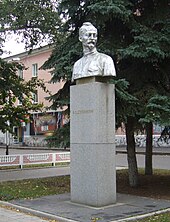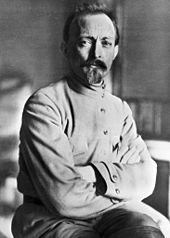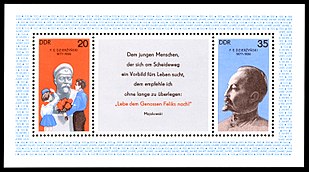Feliks Dzierżyński
Feliks Edmundowitsch Dzierżyński ( Russian Феликс Эдмундович Дзержинский Felix Edmundowitsch Dzerzhinsky ; * August 30th July / September 11th 1877 greg. In Oziembłowo , Russian Empire ; † July 20, 1926 in Moscow was a Polish professional revolution . Dzierżyński was the organizer and first head of the All-Russian Extraordinary Committee to Combat Counterrevolution and Sabotage ( Cheka ), the first secret police in Soviet Russia .
Life
Dzierżyński was born on his father's estate in Oziembłowo in Ujesd Oschmjany in the then Vilna governorate in the far west of the Russian Empire ; Today the place bears the name Djarshynava and has belonged to the Belarusian Stoubzy Rajon since 1991 . His father Edmund Dzierżyński came from the impoverished Polish-Lithuanian nobility and was a teacher by profession. In childhood, Felix dreamed of becoming a priest . Only he and his brother Zygmunt (later a popular professor of Polish studies at the Adam Asnyk Lyceum in Kalisz and anti-communist , † 1931) were able to attend a higher school. In August 1887, Dzierżyński was admitted to the first class of the grammar school in Vilnius . Józef Piłsudski , who was ten years his senior, attended the same school . But before Dzierżyński could graduate, he was de-registered for “revolutionary activities”.
In 1900 Dzierżyński became one of the founders of the Social Democratic Party of the Kingdom of Poland and Lithuania (SDKPiL), in which he took over the management of the foreign department in 1902 and was elected a board member in 1903. In 1905/06 he was one of the leading activists in Russian-administered Poland , especially in Warsaw and Łódź , and at the same time represented his party, which was increasingly internationalist and class-struggle, in the Central Committee of Russian Social Democracy . Dzierżyński was imprisoned six times by 1915 and deported to Siberia twice . In 1908, while in Siberian exile, he wrote his later widely read prisoner's diary . He spent a total of eleven years in prison, including several years in prison , where he fell ill with tuberculosis .
Since April 1917 Dzierżyński was a member of the executive branch of the Russian groups within the SDKPiL. In the summer of 1917 he joined the Bolsheviks and became a member of their Central Committee . During the October Revolution he was one of the leaders of the armed uprising of the Bolsheviks against the Provisional Government of Alexander Kerensky in Petrograd .
After the victory of the Bolsheviks end of 1917 Dzierżyński created at the instigation of Lenin that as secret police operating All-Russian Extraordinary Committee for Combating Counterrevolution and Sabotage (Cheka), whose leader he remained until his death. After the uprising of the Left Social Revolutionaries in July 1918, he was temporarily suspended from office at his own request. On September 5, 1918, after Fanny Kaplan's failed attempt to assassinate Lenin , he received the order from him to begin the Red Terror . In this context, the number of labor camps was increased to 107 by the end of 1920. Following the example of the reign of terror during the French Revolution, the Cheka killed alleged or actual counterrevolutionaries and, according to various sources, often focused its public image on deterrence rather than on establishing the truth.
During the Polish-Soviet war from 1919 to 1921 Dzierżyński was a member of the war council of the Soviet commander Mikhail Tukhachevsky . In 1920 he was placed at the head of the Polish Revolutionary Committee created by the Soviets in Białystok , which had been conquered by the Soviets and which was given the task of transferring the province of Posen and Upper Silesia to the German Empire in Poland (which, according to the wishes of the Polish Communists, was to surrender the province of Poznan and Upper Silesia to the German Reich and join Soviet Russia ) to prepare for the communist takeover. However, the Polish victory in the Battle of Warsaw in 1920 thwarted these plans. In 1921 Soviet Russia and Poland signed the Riga Peace Treaty .
After this war until his death, Dzierżyński held various high positions. He remained head of the Cheka, now called the United State Political Administration (GPU), was People's Commissar ( Minister ) for Internal Affairs until 1921 , and then Minister of Transport until 1923. As chairman of the Supreme Economic Soviet , he led the development of many economic regions in the Soviet Union from 1924 . In April 1923 he founded the sports company "Dynamo" in Moscow .
Dzierżyński died in 1926 of a myocardial infarction immediately after a speech he gave to the Central Committee . His successor to the post of head of the secret service was his deputy Vyacheslav Menschinski , who, like Dzierżyński, was of Polish descent.
Dzierżyński was married to Zofia Dzierżyńska (1882–1968), a childhood friend of Rosa Luxemburg .
Aftermath

After his death, and especially after 1945, many statues were erected in Dzierżyński's honor. After the collapse of the Soviet Union , almost all monuments, especially the one in Moscow in front of the building of the Lubyanka , which serves as a prison and GPU headquarters , were removed. The statue that stood in front of the Lubyanka until 1991 is now in the Sculpture Park on the Moscow River . In the Russian city of Dzerzhinsk, named after him, near Nizhny Novgorod in Moscow Oblast and in the city of Salawat in Bashkortostan, there are still monuments in his honor, and in the latter there is also a street named after him.
Quite a few Polish compatriots had condemned his monument in Warsaw as a gross violation of their national pride, as Dzierżyński had always denied the relevance of national concerns for the socialist movement. The bourgeois-patriotic Poland therefore saw in him a traitor and a hostile agent.
A new Dzierżyński monument was erected in Djarshynsk in Belarus by President Aljaksandr Lukashenka . In addition, a new Dzierżyński monument was inaugurated on May 26, 2006 in the Military Academy in Minsk , which is a faithful (smaller) copy of the former Moscow monument. One of the main streets in Minsk also bears his name.
The Ukrainian city of Kamjanske was called Dniprodzerzhynsk between 1936 and 2016.
A division of the special forces of the Russian Interior Ministry is named after him. The GDR Ministry for State Security (Stasi) named its guard regiment Feliks Dzierzynski after him.
The mechanical engineering company FED (originally FED Labor Commune), made famous by its cameras, was named after the initials of his name.
In 2017, the National Guard of the Russian Federation decided to give the Saratov branch of this facility the original name "The Red Flag Institute called Dzerzhinsky FE".
Fonts
- Selected articles and speeches 1908-1926. Dietz Verlag Berlin 1953.
- Selected writings in two volumes. Volume I: 1897-1923. Preface by Erich Mielke . (Ed.) University of the Ministry for State Security, Potsdam 1984. ( Red "Tscheka series" of the MfS )
- Selected writings in two volumes. Volume II: 1924-1926. (Ed.) University of the Ministry for State Security, Berlin 1986. ( Red "Tscheka series" of the MfS )
- Pisma wybrane. Wydz. historii partii KC PZPR . [Selected writings] (Ed. Tadeusz Daniszewski). Książka i wiedza, Warszawa 1955 (Polish)
literature
- Oscar Blum : Russian heads. Kerensky, Plekhanov, Martov, Chernov, Savinkov-Ropschin, Lenin, Trotsky, Radek, Lunacharsky, Dzerzhinsky, Chicherin, Zinoviev, Kamenev. With 9 portraits. Schneider, Berlin 1923.
- NI Subow: Feliks Dżierzyński. A biography. Third expanded edition, Deutscher Verlag der Wissenschaften, Berlin (East) 1975.
- Nikolai Machwiladze: Feliks Dzierżyński. Life and work in images and documents. Progress, Moscow 1975.
- Feliks Edmundowitsch Dzierzynski. Life and work 1877–1926 . 2 vol., Offizin Andersen Nexö, Leipzig 1976
- Robert Blobaum: Feliks Dzierzynski and the SDKPiL: A study of the origins of Polish Communism . Columbia University Press, New York 1984.
- Zofia Dzierzynska: years of great struggles. Feliks Edmundowitsch Dzierzynski - as a person, husband and father . Military publishing house of the GDR, Berlin (East) 1977.
- Bolshaya Sovetskaya Enziklopedija. Volume 8, Moscow 1972. Article Дзержинский Феликс Эдмундович in the Great Soviet Encyclopedia (BSE) , 3rd edition 1969–1978 (Russian)
- SS Chromow: Feliks Dzierzynski. Biography. Dietz Verlag, Berlin (East) 1980 (3rd expanded edition 1989. ISBN 3-320-00989-3 )
- Liliana Riga: Reconciling nation and class in imperial borderlands: the making of Bolshevik internationalists Karl Radek and Feliks Dzierzynski in east central Europe. In: Journal of Historical Sociology , 19 (4), 2006, pp. 447-472. ISSN 0952-1909
- F. Ė. Dzerzinsky. Gosudarstvennaja bezopasnostʹ . OV Selin. Algoritm, Moscow 2008, ISBN 978-5-699-30517-9 .
Movies
- Civil War in Russia (TV-ZDF 1967/68, five parts, director: Wolfgang Schleif , with Dieter Wagner in the role of Dzerzhinsky)
- Enemy whirlwind ( Vikhri vrazhdebnye / Wichri wraschdebnye ), USSR 1953, directed by Michail Kalatosow . With Micheil Gelowani (Stalin), Michail Kondratjew (Lenin), Vladimir Jemeljanow (Dzerzhinsky), Leonid Lyubaschewski (Sverdlov) and Vladimir Solovyov (Kalinin).
- Lenin in October ( Lenin v oktyabre , USSR 1937, director: Michail Romm , with Vladimir Prokrowsky in the role of Dzerzhinsky).
- Lenin 1918 .
- Distinguishing marks: none ( Osobych primet net ) USSR / POL / GDR 1979, director: Anatoli Bobrowski, screenplay Julian Semjonow
- Krach Operazii Terror ( The Failure of Operation Terror ), USSR / POL 1980, directed by Anatoli Bobrowski, screenplay Julian Semjonow
Web links
- Literature by and about Feliks Dzierżyński in the catalog of the German National Library
- Newspaper article about Feliks Dzierżyński in the 20th century press kit of the ZBW - Leibniz Information Center for Economics .
- Clara Zetkin: On the death of Felix Dzierzynski.
- JW Stalin: F. Dzierzynski. ( Memento from September 25, 2017 in the Internet Archive )
- Dzerzhinsky - First Chekist and Stalin's executioner , Die Welt , June 27, 2015
- Jelena Jegorowa: Две стороны жизни Дзержинского The Two Sides of the Life of Dzerzhinsky (2008, Russian)
Individual evidence
- ↑ Две стороны жизни Дзержинского - аверс (Елена Николаевна Егорова) / Проза.ру. (No longer available online.) Archived from the original on August 23, 2011 ; accessed on April 12, 2018 . Info: The archive link was inserted automatically and has not yet been checked. Please check the original and archive link according to the instructions and then remove this notice.
- ↑ a b БИОГРАФИЯ ФЕЛИКСА ДЗЕРЖИНСКОГО. Retrieved April 12, 2018 (Russian).
- ↑ cf. Philipp Ewers: Feliks E. Dzierżyński: Iron Chekist and celebrated hero. edition berolina, Berlin 2018, chapter beginning Dzierżyński as Tscheka chairman and Jonathan D. Smele: Historical Dictionary of the Russian Civil Wars, 1916–1926 , Rowman & Littlefield, 2015, p. 355.
- ^ Anne Applebaum : Gulag: A History . Random House LLC , New York City 2007, ISBN 978-0-307-42612-3 , pp. 45 (English, Google Books [accessed October 29, 2019]).
- ^ AFP and dpa: Kremlin has the "Felix Dscherschinski" division deployed. In: zeit.de. December 6, 2011, accessed December 21, 2016 .
- ↑ Саратовский институт вернет себе имя Феликса Дзержинского. Retrieved April 12, 2018 .
| personal data | |
|---|---|
| SURNAME | Dzierżyński, Feliks |
| ALTERNATIVE NAMES | Dzerzhinsky, Felix Edmundowitsch; Дзержинский, Феликс Эдмундович (Russian) |
| BRIEF DESCRIPTION | Polish-Russian professional revolutionary |
| DATE OF BIRTH | September 11, 1877 |
| PLACE OF BIRTH | Oziembłowo |
| DATE OF DEATH | July 20, 1926 |
| Place of death | Moscow |



